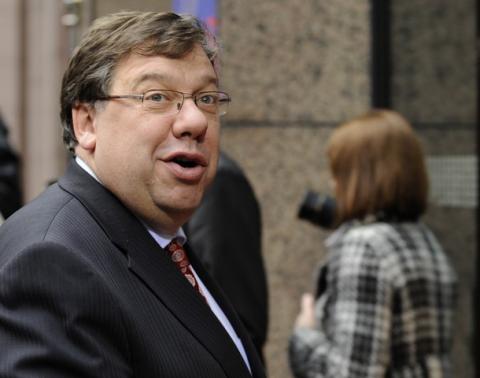The country will be ruined, and nothing will change

It hardly matters whether we have to be rescued by the EU or the International Monetary Fund in a few months, writes Vincent Browne.
The outcome will be more or less the same - aside from the humiliation of having to acknowledge that we are not capable of running our own country.
The bank bailout will cost us very much more than the €50 billion figure we were told a few weeks ago. The budgetary deficit will get worse, not better; unemployment will increase; there will be more mortgage defaults; the scale of inequality here will widen; Fianna Fáil will survive.
The bank bailout will cost more simply because the €50 billion calculation was made on the assumption that property prices will not have fallen, or will not fall below the levels they were at in November 2009. Anybody who has any exposure to the property market knows this is nonsense.
Property prices have kept falling gradually from last November until about a month ago. Since then, they have fallen precipitously.
Estate agents say nobody is even viewing properties now, and that properties which were ''sale agreed'' are now ''sale unagreed''.
Would-be purchasers are looking for their booking deposits back.
Perhaps this, in part, has to do with speculation that stamp duty will be abolished or sharply reduced in next month's budget, or with anxiety about where the economy is going, in anticipation of a drastic budget.
But that is only part of the explanation. Property prices are way below the November 2009 level, and are likely to fall further because the banks are in no position to give mortgages on terms people can meet. The bank bailout has to cost more than we were told.
The budgetary deficit will get worse, because the calculation of 1.5 per cent growth next year is likely to prove too optimistic.
Growth will be worse than even the most pessimistic scenarios are suggesting because there is little optimism of robust growth in our external markets.
The scale of the €6 billion budgetary adjustment, unaccompanied by the sense we can get out of our difficulties, will deflate the economy further - possibly leading to negative growth next year.
Yes, it will be a relief to be rid of this present government some time in the first half of 2011, but is there any realistic expectation that a government led by Enda Kenny will engender the confidence and optimism that, at last, we know what we are doing?
Even aside from the Kenny factor, there is the implausibility that a government including a party as brazenly opportunist as the Labour Party - which seeks to dodge every difficult decision, lest would-be middle-class supporters be frightened - could deal with the crisis.
Unemployment will get worse because of the deflation the budget will cause, and the flight of optimism the political establishment is engendering.
There will be more mortgage defaults because of higher unemployment, But the really depressing aspect to all this misery is that nothing will change fundamentally.
The dreary steeples of Fianna Fáil and Fine Gael will still dominate the political landscape. The old establishments, with all their cosseted vested interests, will remain undisturbed - and the rest of society can go to hell, as usual.
There was a hope the crisis could propel change: a change in our institutional structures allowing for greater democracy and accountability; a change in how we distribute wealth, income, power, influence and status. But that hope has disappeared.
RTE, the dominant voice in Irish media (because of the €200 subsidy - a hangover from its long broadcasting monopoly - and, to be fair, the excellence of much of its programming), set the agenda for much of our political debate.
It is so depressing to hear interviewers in high-profile programmes relentlessly and invariably pose questions on assumptions that, for instance, social welfare has to be cut; that the ''pain'' has to be spread across all of society; that any insistence the rich should pay for the crisis - having been enriched in the boom - is a mirage. (Yes, they can.)
Those on the left have failed dismally to persuade people that social welfare doesn't have to be cut - indeed, that there is a strong case, for instance, for increasing old-age pensions considerably. Doubling the old age pension and removing all the tax breaks for pensions would produce a net saving of nearly €3 billion a year. That would be fair, as it would treat all pensioners equally.
It is dismal, too, that the political system will remain the same, with the same level of unaccountability as that which got us into this trouble. The Dáil is a bystander to the crisis, to what caused it and to what might get us out of it.
Furthermore, after all the wanton damage Fianna Fáil has done to the country, there is still a prospect it might get 20 per cent of the vote in the next election and win a few seats.
